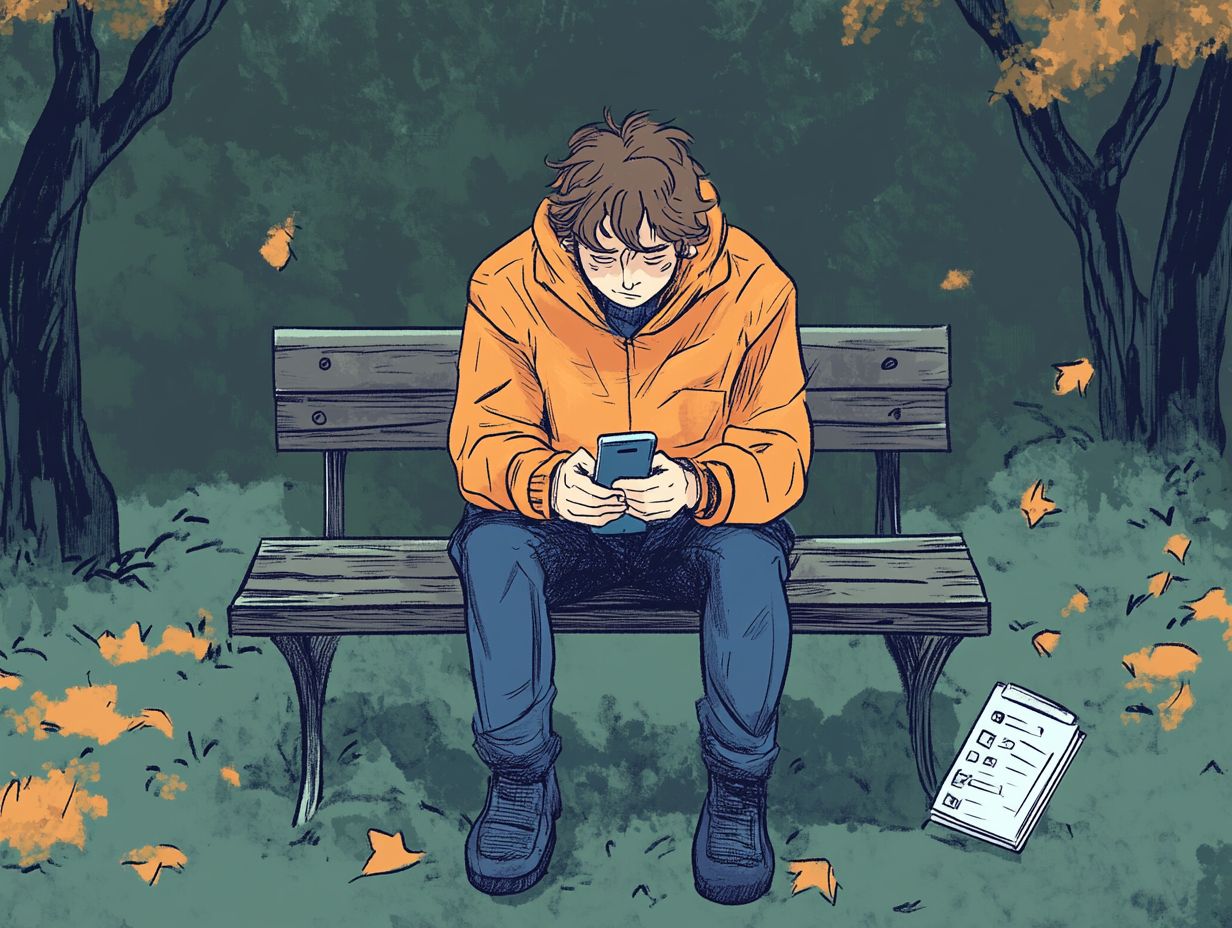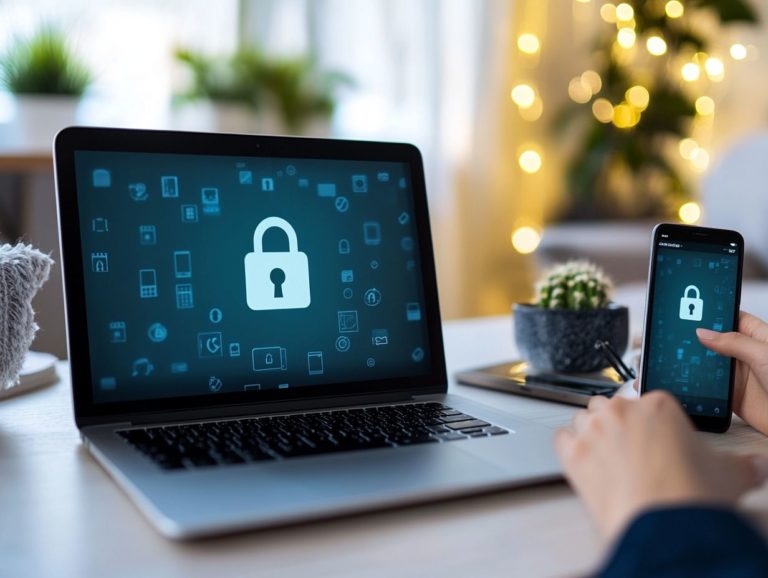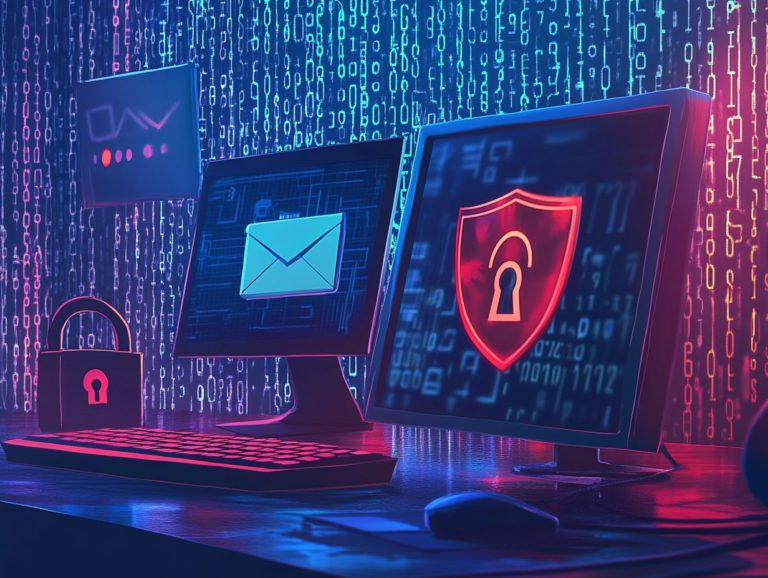what should i do if i become a victim?
Becoming a victim can be a disorienting and challenging experience, often leaving you uncertain about what to do next. It is vital to take action immediately.
Understanding what it means to be a victim and the impact it can have on your life is essential for navigating this tough period. This guide reveals crucial steps you must take now, from ensuring your safety and documenting evidence to managing your emotions and seeking legal assistance.
Whether it involves finding support or understanding your rights, you will be walked through everything you need to know to reclaim your sense of control and move forward with confidence.
Contents
- Key Takeaways:
- Understanding Victimhood
- Immediate Steps to Take
- Documenting Evidence
- Dealing with Emotions
- Managing Trauma and Coping Strategies
- Reporting the Incident
- How to Report and What to Expect
- Seeking Legal Help
- Frequently Asked Questions
- What should I do if I become a victim of a crime?
- What should I do if I become a victim of identity theft?
- What should I do if I become a victim of cyberbullying?
- What should I do if I become a victim of domestic violence?
- What should I do if I become a victim of fraud?
- What should I do if I become a victim of sexual assault?
Key Takeaways:

Seek immediate safety and support if you become a victim. Document evidence and manage your emotions to help cope with the trauma. Understand your rights, report the incident, and seek legal help to pursue justice and hold the offender accountable.
Understanding Victimhood
Understanding victimhood is essential for grasping the emotional and psychological effects that crimes such as identity theft and domestic violence can inflict.
As a victim, you may face numerous challenges, including the loss of personal information and financial stability. These challenges can leave you feeling vulnerable and isolated.
Recognizing the nuances of victimhood enhances awareness and cultivates a supportive environment where you can reclaim your agency, navigate the legal system, and access resources for healing and advocacy.
Defining Victimhood and Its Impact
Victimhood refers to the experience of being harmed by a crime and the emotional aftermath that often follows. Feelings of fear, anxiety, and depression can profoundly disrupt daily life.
This state can arise from various offenses such as theft, assault, domestic violence, or cyberbullying. Each offense uniquely shapes the psychological landscape of those affected.
As a victim, persistent feelings of vulnerability may distort your perception of safety, even in familiar surroundings.
The societal perspective on victims is complex. While many express genuine empathy, some may unintentionally engage in victim-blaming, which means placing blame on the victim for what happened to them. This only complicates the healing process.
Fortunately, many support services ranging from counseling and support groups to hotlines are available to help you navigate your recovery, reclaim your sense of agency, and rebuild your life.
Immediate Steps to Take
If you are a victim of a crime, taking immediate action is crucial to ensure your personal safety and access the support services you need. This includes crafting a safety plan, seeking emergency assistance, and promptly reporting incidents to the police.
By familiarizing yourself with available resources such as shelters and victim assistance programs, you can navigate your situation with greater confidence and begin to regain control over your life.
Seeking Safety and Support
Following a crime, prioritizing safety and seeking support services is essential for you to begin the healing journey.
This path to recovery can be significantly enhanced by various resources tailored specifically for victim assistance.
Emergency hotlines provide immediate access to trained professionals ready to offer guidance and reassurance during crisis moments.
Numerous shelters serve as safe havens, offering a secure environment free from the shadows of trauma.
Counseling options, whether through individual or group therapy, help you process your experiences and connect with others who understand your struggles.
By utilizing these vital safety measures and support services, you can reclaim your sense of security and discover the strength to move forward.
Don t hesitate to seek help. Take action now to ensure your safety and well-being.
Documenting Evidence

Documenting evidence is an essential step for you as a victim of crime. It provides crucial information that can support legal proceedings and help establish a clear narrative.
By carefully collecting witness statements, you can create a comprehensive account of the events that unfolded.
Gathering financial documents, such as bank statements, can uncover unauthorized charges. These records bolster your claims. They serve as a safety net in future legal actions.
Each piece of information, from photographs of the crime scene to correspondences with authorities, strengthens your case. This ensures that your voice is heard and your rights are protected.
Dealing with Emotions
Navigating the emotional aftermath of a crime can be a challenging journey for you. Confronting feelings of trauma, anxiety, and uncertainty about your personal safety is crucial.
Employing effective coping strategies, such as seeking counseling services and relying on your support networks, is vital for your recovery process.
By understanding your rights as a victim and accessing victim assistance groups, you can reclaim control over your life and emotions.
Managing Trauma and Coping Strategies
Managing trauma requires you to recognize the emotional wounds that crime can inflict. Exploring various strategies aimed at promoting healing is important.
Emphasizing your emotional health lays a strong foundation for recovery. This enables you to confront and process your feelings rather than suppress them.
Counseling services provide professional guidance to help you manage your feelings. Support networks comprising friends, family, and advocacy groups offer invaluable encouragement and understanding.
Together, these resources cultivate resilience, enabling you to reclaim your life and prioritize your emotional well-being in the aftermath of trauma.
Reporting the Incident
Reporting an incident is an essential step for victims of crime. It sets the legal wheels in motion and safeguards your rights while facilitating the pursuit of restitution.
By grasping how to navigate this process, you can feel more enabled and supported as you work through the aftermath of your experience.
How to Report and What to Expect
Knowing how to report a crime can ease your worry and help you regain control. Understanding this process is vital for you, as it ensures your rights are upheld.
When you report an incident, it’s crucial to provide clear details think location, time, nature of the crime, and any information about the suspect. You can find comfort in knowing that law enforcement is trained to handle these cases with care, ensuring confidentiality where needed.
You can find legal advice to support you during this challenging time. This guidance makes sure you feel supported as you pursue the justice you deserve.
Seeking Legal Help

Seeking legal help is an essential step for you as a victim. It allows you to fully understand your rights, pursue restitution, and effectively navigate the complexities of the criminal justice system.
Partnering with a reputable attorney can offer you the guidance and support needed to advocate for yourself in the aftermath of a crime.
Understanding Your Rights and Options
Understanding your rights and options as a victim is crucial for navigating the legal landscape after a crime. This knowledge enables you to make informed decisions and advocate effectively for your needs.
It s not just about dealing with the immediate aftermath; it s also about preserving your dignity and securing justice for the long haul.
Under the Crime Victims Rights Act, you have a clear set of entitlements. This includes:
- The right to be informed about court proceedings.
- The opportunity to present a victim impact statement, which describes how the crime has affected you.
- Access to various support services.
You can explore different avenues for legal recourse, such as filing civil lawsuits or seeking restitution from offenders. Advocacy groups play a vital role in this journey, helping ensure that you are aware of your rights and are equipped to navigate the often-complex legal system with confidence.
Finding a Lawyer
Finding a lawyer who specializes in victim advocacy can significantly enhance your ability to navigate the legal system. This step not only provides you with legal help but also offers emotional support during what can be an incredibly challenging time.
Seek out attorneys with a proven track record in handling cases similar to yours, as their familiarity can greatly influence the outcome. Look for legal professionals who offer free consultations; this allows you to discuss your options without incurring immediate costs.
Explore local resources, such as victim support groups, to find reputable attorneys. Utilizing these resources enables you to make informed choices and paves the way for your journey toward justice.
Frequently Asked Questions
What should I do if I become a victim of a crime?
If you become a victim of a crime, prioritize your safety and well-being. Seek medical attention if needed, and then contact the authorities to report the crime.
What should I do if I become a victim of identity theft?

If you become a victim of identity theft, immediately contact your bank and credit card companies to freeze your accounts. Report the issue to the police, monitor your credit report, and consider placing a fraud alert.
What should I do if I become a victim of cyberbullying?
If you become a victim of cyberbullying, document the harassment and report it to the appropriate authorities or online platforms. Seek support from trusted friends or family members.
Consider reaching out to a mental health professional for coping strategies.
What should I do if I become a victim of domestic violence?
If you become a victim of domestic violence, seek immediate help by calling the National Domestic Violence Hotline at 1-800-799-7233. Create a safety plan and seek support from a local domestic violence shelter or counseling services.
What should I do if I become a victim of fraud?
If you become a victim of fraud, contact your bank or credit card company immediately to freeze your accounts. Report the issue to the Federal Trade Commission and consider filing a police report.
Keep all evidence and documentation related to the fraud.
What should I do if I become a victim of sexual assault?
If you become a victim of sexual assault, prioritize your safety and well-being. Seek medical attention and contact the authorities to report the crime.
Consider reaching out to a sexual assault hotline or support group for additional resources and support.
Don t wait reach out for help or further information today!






